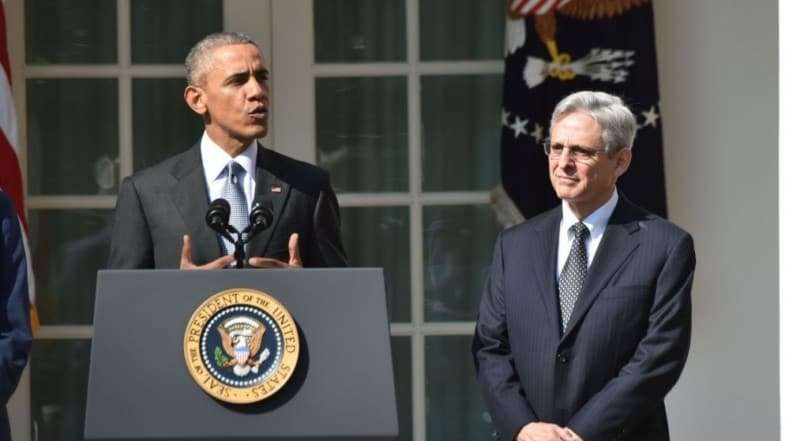The Volokh Conspiracy
Mostly law professors | Sometimes contrarian | Often libertarian | Always independent
GOP Senators may be justified in blocking the Garland nomination until the election - but not if it opens the door for Trump

Judge Merrick Garland, President Obama's nominee for the Supreme Court seat opened by Justice Scalia's death, is a unquestionably a well-respected and highly qualified jurist. I agree with most of co-blogger Jonathan Adler's praise of him. At the same time, it is unlikely that Obama would have nominated Garland if he were not going to be a reliable liberal vote on most major issues that might come before the Supreme Court. Given the current state of polarization over constitutional law issues, Republican senators and others who oppose Garland's judicial philosophy have good reason to oppose his nomination, so long as there is a real chance of getting someone significantly better after the election.
No one has better explained the justification for senatorial consideration of judicial philosophy than then-Senator Obama in his 2006 speech justifying his opposition to the nomination of Justice Alito (which Obama had previously tried to prevent from even coming to a vote, by using the filibuster):
There are some who believe that the president, having won the election, should have complete authority to appoint his nominee and the Senate should only examine whether or not the justice is intellectually capable, and an all-around good guy. That once you get beyond intellect, and personal character, there should be no further question as to whether the judge should be confirmed.
I disagree with this view. I believe firmly that the Constitution calls for the Senate to advise AND consent. I believe that it calls for meaningful advice and consent that includes an examination of a judge's philosophy, ideology, and record.
Obama opposed Alito's nomination even though he had "no doubt that Judge Alito has the training and qualifications necessary to serve" and noted that Alito "is an intelligent man, and an accomplished jurist."
My point is not to criticize Obama on this issue, but to emphasize that he was right. I took the same view back in 2007 during the Bush administration (when I expressed agreement with Democratic Sen. Charles Schumer), and it is just as valid today.
Senators opposed to a nomination have broad discretion as to how they go about doing it. They have no constitutional obligation to hold hearings (which did not exist at all until 1916) or to take a vote. The Constitution does not impose any such requirement.
Some argue that, even if the Constitution does not require the Senate to hold hearings and take a vote, informal political norms do. I am very much in favor of establishing a norm under which all judicial appointees get hearings and a vote within a reasonable period of time (perhaps six months). But no such norm currently exists. The truth is that both parties routinely hold up nominations and refuse to take votes when they consider it advantageous to do so. That is increasingly the "new normal" of the last fifteen to twenty years. And then-Senator Joe Biden in 1992 and soon-to-be Senate Democratic leader Charles Schumer in 2007 made clear that Democratic senators would not hesitate to hold up a GOP Supreme Court nominee in the last year of a president's term.
In sum, neither the Constitution nor established political norms require the Senate to either hold hearings or vote on Garland. Nonetheless, I believe the Senate should confirm him in at least one scenario that now seems increasingly likely: if Donald Trump becomes the Republican nominee.
Flawed as his judicial philosophy might be in some ways, Garland is far preferable to the sorts of justices that Trump is likely to appoint, who might well carry out his priorities of making it easier to use libel suits and other tools to suppress his critics, and undermine constitutional property rights. Such justices are also highly unlikely to have any real respect for other important constitutional rights, or to be committed to originalism.
With the significant exception of Citizens United and other issues involving campaign finance, a moderate liberal jurist like Garland will at least protect freedom of speech and many other important civil liberties. There is no assurance that Trump nominees will do so. Despite its unpopularity, I believe Citizens United was right, and would lament its reversal. But a Trump victory in the election would not save Citizens United. Trump opposes it too, and is therefore unlikely to appoint judges who would preserve it.
GOP senators could, of course, simply oppose an objectionable Trump nominee when and if he appoints one. But it is politically difficult for senators to oppose nominees by a president of their own party, especially if it means undercutting him early on in his presidency.
Of course, if current polls are correct, Trump would probably lose a general election. But Hillary Clinton is unlikely to give Republicans a nominee they like better than Garland, whom most conservatives and libertarians concede is the least objectionable of the people featured on recent Democratic shortlists.
Ultimately, GOP senators may have a reasonable justification for blocking the Garland nomination until the election, based on opposition to his judicial philosophy. But it would be irresponsible to leave the door open for a Trump nomination. And Garland is also preferable to what we might well get in the likely event of a Hillary Clinton victory.


Show Comments (0)